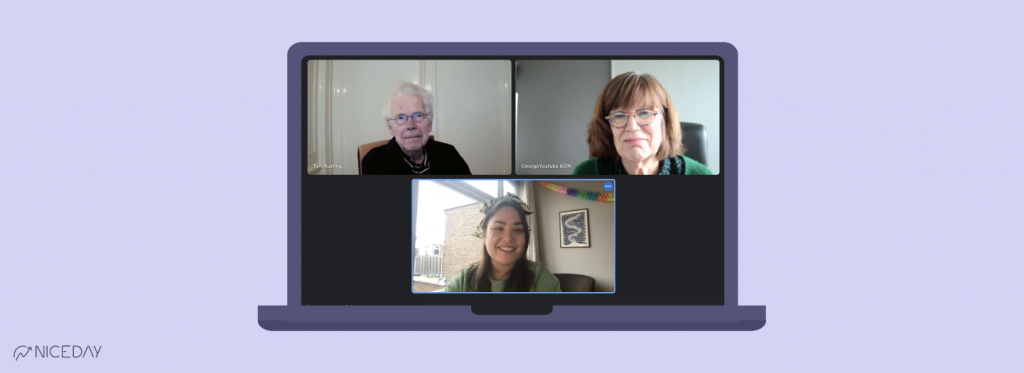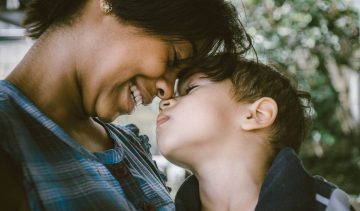Tiny van Hees and Tom Rusting started their collaboration 15 years ago, based on a shared motivation to help family members of people with psychological complaints. A strong combination of Tom as a family experience expert and Tiny as a Social Psychiatric Nurse. With their foundation ‘Stichting Naastentraining’, they help people to better understand their loved one’s mental illness and teach them communication methods to better deal with it. Feeling empowered instead of powerless is an important result of this because feeling powerless is a common problem among family and friends of people with mental problems. They offer valuable training for family and loved ones, that also has an indirect and positive effect on the client.
Tom as a family experience expert
Tom first came into contact with mental health care when his son started dealing with mental complaints at the age of 20. He was diagnosed with psychosis sensitivity or, as it was then called, schizophrenia. Tom and his family went through rough times; their son has been hospitalized several times, forced or in crisis, but also ran away again. Ultimately, his son ended up seeing a psychiatrist who saw the importance of involving the family in their son’s recovery. She saw that they were driven, motivated and competent enough to guide their son. This creates a leverage effect: if you, as a therapist, spend time with the parents, they then can continue to put into practice what they have learned.
His son is now 41 years old and he has been doing well for quite some time already, but Tom felt like he needed to do something with the experience and knowledge he had gained. Experience that he would prefer not to have, but which nevertheless gives him comfort knowing that he can do something good with it. He learned to use his experience to coach the family and loved ones of other clients.
Tiny as a Social Psychiatric Nurse
Tiny is a Social Psychiatric Nurse and has been working in health care for over 40 years, of which 30 years in mental health care. Tiny has been providing family counselling and support to the family at Altrecht in the Prevention Department for over 15 years and she has been doing family coaching with ‘Stichting Naastentraining, together with Tom, for 2 years now. In her work at Altrecht, Tiny noticed that there were very few relatives of a non-Western background in her family groups. “Some people do not participate because they cannot follow the session well, but also the explanatory behaviour for psychoses can differ. When you think differently from others in your group, this can be difficult,” says Tiny.
Tom and Tiny
Tom and Tiny found each other in their shared concerns about involving families in treatment; both from their own different experiences. They first started with training for non-Western families, but they soon expanded their target group to include Western families. Together they now train and coach families from all over the country with their ‘Stichting Naastentraining’. They do this free of charge and without any personal interest.
The support of family is something that, according to Tiny, should happen much more and should be the standard: “When someone is in hospital with a heart attack, the family is extensively informed about the disease and the options for treatment, but this is not the case in mental health care”. The privacy reason is often assumed here: the client may not want it, so we won’t do it. But according to Tiny and Tom, this should change: things will improve when you include family!
Why family and loved ones?
But why focus on family and loved ones? A prevailing feeling of anger and powerlessness among the parents or family, says Tiny. “During my work, I noticed that there is so much suffering in families and that they experience so much powerlessness when their family member suffers from mental complaints. As a therapist, you have twenty minutes or an hour a week or every two weeks to be in contact with your client. But very often, the family is in contact with their relative every day. This can make it extremely difficult to deal with a family member with mental complaints.”
Tom also agrees that the current mental health care can no longer meet the demands of the family. Many parents feel desperate when, for example, they cannot always participate in treatment, while they do get the child at home when it is released from a hospital setting. There is so much evidence that the client’s prognosis improves when attention is paid to his or her family. If they learn to deal with it better, the future will look better, also for the client.
How do you coach family and loved ones?
It’s mainly about communication, according to Tom. How do you deal with a psychologically vulnerable person in your environment or family? Tom talks about his own experience with his son, who at the time had psychosis and suffered from delusions. “When that started with my son, I thought: I have to talk this out of his head. Come on, do you really think that the fire detector on the ceiling is a camera? That there is a big conspiracy? Don’t be such a fool, use your common sense! I think that’s a fairly normal reaction for parents, but it has the opposite effect and creates distance. We give parents tools and training to have that contact in a different and better way. We teach them to deal with this in a respectful, compassionate and judgment-free way. Then the relationship improves and the parents feel less powerless. They have learned something that they can do to help their loved ones. This works both ways: less conflict means that the parents feel less powerless and can tolerate the tensions or situations better. If you also see that you are helping your family or relative, you help each other on the road to recovery”.
“We call our work training, but it is actually a mix of training and coaching. That seems to work well: the combination of Tiny’s professional knowledge and my personal experience. We work according to clear programs with the help of Tiny’s knowledge, but sometimes you can explain certain things to people a little more convincingly if you say: “I understand you, I’ve been through that as well”, or “I tried it like this once and it didn’t work, but when I approached it this way, it did.”.
Tiny: “The training or coaching of family or loved ones is not about the diagnosis of the client, the family can sometimes tell us but sometimes they can’t. We teach them communication methods to deal with the situation and to learn to accept it”.
What are the positive results?
“We especially see powerless parents change into parents that know how to deal with the situation”, according to Tiny. “They let us know how the mutual understanding in their family has improved. But in addition, we also see that they understand more about how the mental health care system works and how they can best relate to it.”
What would you like to tell therapists about the Stichting Naastentraining?
“Inform clients of the training of family and loved ones and realize that we position ourselves as allies of therapists. We are here for support and will never contradict therapists. Our work hopefully makes it, but we actually know that for sure, easier for the therapist to do their job effectively. We make sure that the family has a better understanding of what is going on and how they can contribute. We are allies of the client, family, but also therapists.”
More information?
Stichting Naastentraining offers free, professional and individual training and coaching, in both English and Dutch, via Zoom. Would you like to know more about what they can do for you or your clients? Take a look at www.naastentraining.nl/.











